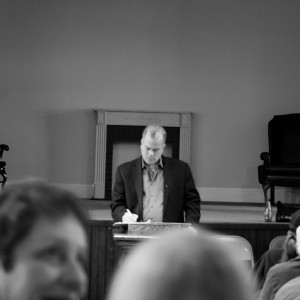 The electoral race between Speaker of the House Nicholas Mattiello and his Republican challenger Steven Frias has, for obvious reasons, drawn an incredible amount of attention. Both candidates are working very hard to capture every vote they can in their district. But one exceptional aspect of their race has gone unmentioned: they have fewer people to convince to vote for them than in all but one other House district.
The electoral race between Speaker of the House Nicholas Mattiello and his Republican challenger Steven Frias has, for obvious reasons, drawn an incredible amount of attention. Both candidates are working very hard to capture every vote they can in their district. But one exceptional aspect of their race has gone unmentioned: they have fewer people to convince to vote for them than in all but one other House district.
The reason for this anomaly is the very undemocratic (small d) practice of prison gerrymandering. Prison gerrymandering refers to counting all of the people incarcerated at a prison in the district where the prison is located for purposes of creating district lines, even if they don’t legally reside there, are barred from voting there, and must vote (absentee) from their actual home addresses. District 15 has approximately 1,230 of these incarcerated persons being counted as constituents there.

This skewing has a number of consequences. Specifically, as noted above, it means that Speaker Mattiello and challenger Frias actually have 1,230 fewer constituents they have to reach out to and represent. Although they are treated as residents of District 15 for purposes of carving up that district, these incarcerated persons are not considered residents there for any other meaningful purpose, including for purposes of voting. In fact, the many ACI inmates who remain eligible to vote despite being incarcerated are essentially barred by state law from voting in this House race. Instead, they must vote (by absentee ballot, of course) in the election that is taking place where they previously resided.
 There is another impact that flows from this practice: the voting strength of the communities from which the inmates come is diluted, while the political influence of the city residents in which the prison is located is inflated. By inappropriately counting the 1,230 ACI inmates as District 15 residents, every resident of the state not living there has his or her representation diluted by about 8% compared to residents in district 15. Put another way, by virtue of his location, the House Speaker is more powerful than other legislators not just because of his title, but because 92 constituents of his House District have the same influence as 100 residents in almost every other district. (Only neighboring District 20, which also includes portions of the ACI, wields a bigger disproportionate influence.)
There is another impact that flows from this practice: the voting strength of the communities from which the inmates come is diluted, while the political influence of the city residents in which the prison is located is inflated. By inappropriately counting the 1,230 ACI inmates as District 15 residents, every resident of the state not living there has his or her representation diluted by about 8% compared to residents in district 15. Put another way, by virtue of his location, the House Speaker is more powerful than other legislators not just because of his title, but because 92 constituents of his House District have the same influence as 100 residents in almost every other district. (Only neighboring District 20, which also includes portions of the ACI, wields a bigger disproportionate influence.)
In 2013, the ACLU sued to challenge this practice. In a major decision, U.S. District Court Judge Ronald Lagueux agreed that prison gerrymandering violated the one person, one vote requirements of the U.S. Constitution. Unfortunately, earlier this month, the U.S. Court of Appeals in Boston reversed that decision.
As a result, it is now up to elected officials to address the issue. For the past three years, the state Senate has passed a bill that would ban prison gerrymandering, something that four other states and a few hundred municipalities across the country have done in recognition of this problem. Unfortunately, the bill has died in the House in past years. And at the local level, Cranston officials decided it was worth spending taxpayer money (to the tune of $250,000 even before the appeal) rather than make their municipal districts more equitable as so many other localities have voluntarily done.
Once all the votes are counted in the District 15 race on November 8th, we will only be able to speculate what the outcome might have been if the two candidates had to increase their door-knocking to persuade hundreds of additional people (more closely matching the number of constituents that candidates in other districts generally must represent) to vote for them.
We should stop speculating by eliminating its cause. There is no question that Speaker Mattiello cares deeply about his community, just as we are sure Mr. Frias does. Let’s halt the practice of prison gerrymandering so that 1,000 more people can benefit from that care and stewardship, and so that District 15 (and District 20) more fairly represents the same number of residents as other districts.
]]>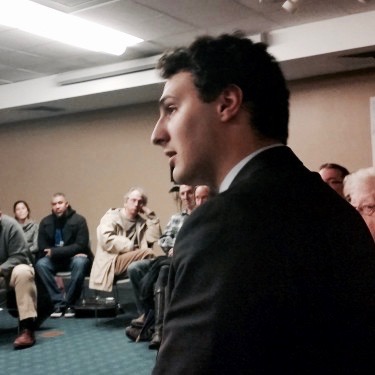
How many Rhode Island inmates are put in solitary confinement? Why are they there? How long do they stay? “And what do they actually look like,” asked Providence Rep. Aaron Regunberg, chair of a new state commission that will answer these and other important questions about the use of solitary confinement at the ACI.
The new commission met for the first time Thursday, and hopes to answer some of those questions at its next meeting on October 20. From there, the commission plans to take a hard look at psychological effects on inmates, public safety effects on society and fiscal impacts on the state budget.
“Is there room for improvement in how we do things, and if so where” asked Regunberg, “Again I want to stress that as a body we’re not starting out with assumptions. We might find out that everything is as reasonably good as it can be … we might find out there are particular rooms for improvement. We’re going to figure that out as we move forward.”
There seemed to be broad agreement on the commission – comprised of prison and prison guard officials, mental health experts and criminal justice advocates and three legislators – that so-called solitary confinement was something worth studying.
“It goes by a number of different names,” said ACI Director AT Wall, a member of the new commission. “We tend to call it restrictive housing. Restrictive housing has emerged as an issue across the country, an issue in inmate management and it’s one that we think we have to take a look at and we are here in a spirit of collaboration to do just that.”
Even Richard Ferruccio, president of the Rhode Island Brotherhood of Corrections Officers, which expressed strong reservations about reforming solitary confinement practices at legislative hearings last year, was hopeful the commission would prove productive.
“I’m looking forward to seeing what we can do to improve our system,” he said. “I think we already have one the better run systems in the country but if we have an opportunity for improvement or ideas, that’s something we’re always looking forward to.”
Mental health advocates said there are “necessary changes” needed in how the ACI uses solitary confinement.
“I’m very happy that all of these people have convened to make these necessary changes,” said Meg Clingham, director of state Office of Mental Health Advocate. “Many of my clients that are criminally involved and at the ACI find themselves in segregation because they are unable to comport their behavior due to their mental illness so I think it’s really great that we are looking for solutions to this problem.”
This was the first of at least six meetings before the commission offers possible recommendations.
The commission’s mandate from the legislature (H8206) includes a preference for administrative rather than legislative reforms. “There are important stakeholders who have expressed a strong preference for administrative over legislative reform,” according to a power point presentation shown at the commission’s first meeting. “As such, if the commission determines there is room for improvement, our first goal is to identify a set of recommendations that can be implemented administratively.”
]]>
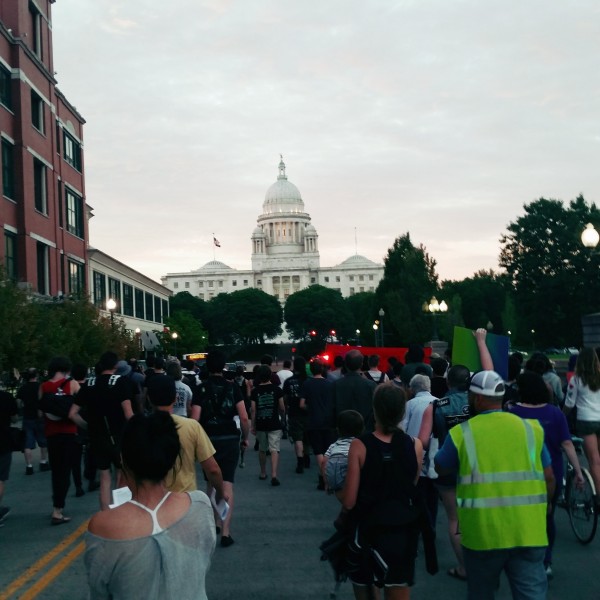 A march from Kennedy Plaza to the Providence Public Safety Complex, with a brief, tense stop in front of the Providence Place Mall was held in Providence Friday evening in solidarity with a National Prison Strike, on the 45th anniversary of the Attica Uprising.
A march from Kennedy Plaza to the Providence Public Safety Complex, with a brief, tense stop in front of the Providence Place Mall was held in Providence Friday evening in solidarity with a National Prison Strike, on the 45th anniversary of the Attica Uprising.
After gathering in Kennedy Plaza, across from Providence City Hall, the march headed for the Providence Place Mall, where it came to a stop, blocking one direction of traffic. Providence Police, lead by Lt. Oscar Perez, had until this time been clearing traffic ahead of the march, but here, with traffic stopped, there was a tense five minutes where a threat of arrest seemed imminent. No arrests took place.
Still, many of the participants felt the police showed their hand in front of the mall. At the Providence Public Safety Complex, after the march, a speaker maintained that though the police were saying that they were “trying to keep us all safe… the second we stopped at the mall… we were threatened with arrest… Safety goes out the window when it comes to capital. They’re here to protect and serve, just not us. They’re here to protect fucking capital.”
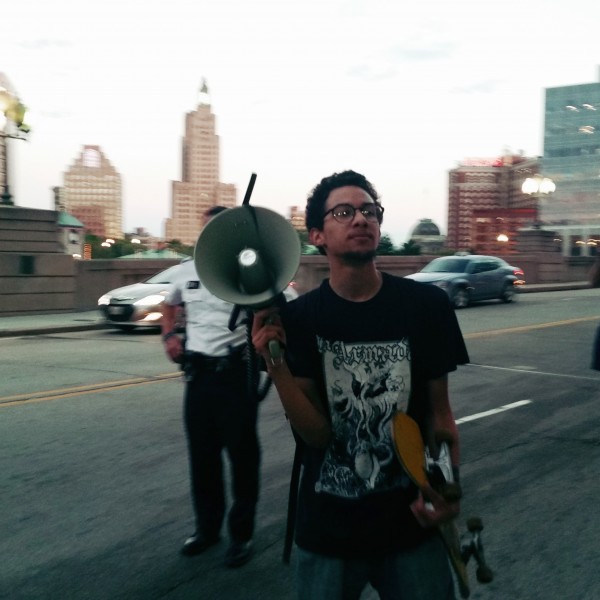 On my way back to Kennedy Plaza after the event Lt. Perez told me, half jokingly, that “those kids kind of hurt my feelings.”
On my way back to Kennedy Plaza after the event Lt. Perez told me, half jokingly, that “those kids kind of hurt my feelings.”
The problems with capitalism, though, is one of the points this strike and the supportve march is trying to make. As the march organizers say on their event page, “Slavery is legal in America. Written into the 13th Amendment, it is legal to work someone that is incarcerated for free or almost free. Since the Civil War, tens of millions of people – most arrested for non-violent offenses – have been used as slaves for the sake of generating massive profits for multi-national corporations and the US government. Today, prison labor is a multi-billion dollar industry which helps generate enormous wealth for key industries such as fossil fuels, fast food, telecommunications, technology, the US military, and everyday house hold products…
“This is not just a prison strike for better wages or conditions, it is a strike against white supremacy, capitalism, and slavery itself.”
This is the context for the stop at the mall. The mall sells products made by prison labor. Not paying prisoners wages for the work they do, or paying them a fraction of what workers outside prisons make, depress the wages of everyone. The slavery system of prison labor has real consequences for everyone, especially the poor and marginalized, who are often only one bad day away from being in prison themselves.
Nationally, the strike is being led by groups such as the Free Alabama Movement, Free Texas Movement, Free Ohio Movement, Free Virginia Movement, Free Mississippi Movement, and many more. Locally, the march was organized by the Providence chapter of the IWW Incarcerated Workers Organizing Committee [IWOC].
The strike is certainly not a one day event. Today, at the Adult Correctional
For more information:
Let the Crops Rot in the Field
Incarcerated Workers Take the Lead
Here’s video from the speak out:
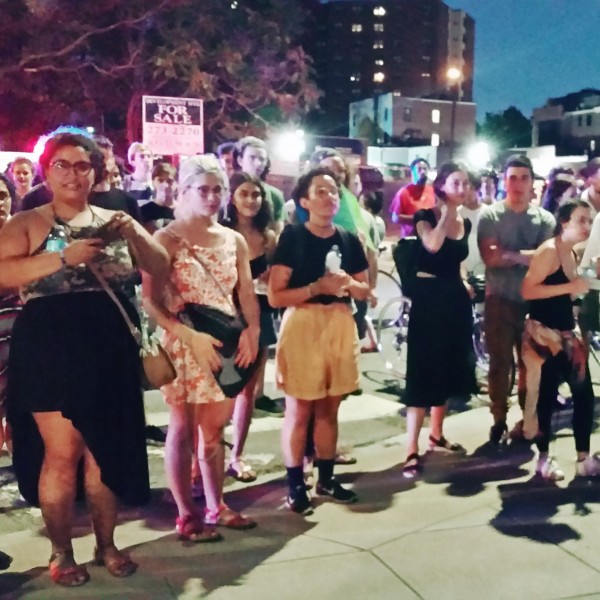
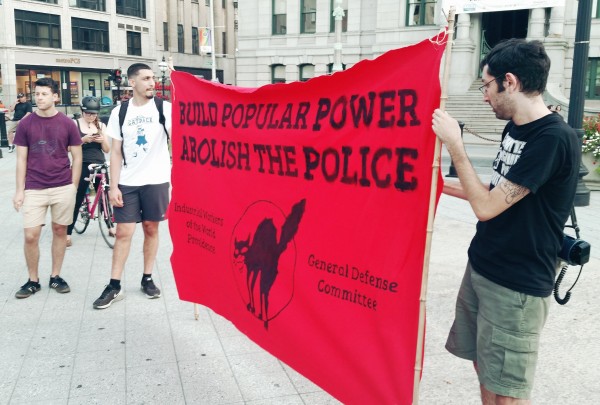
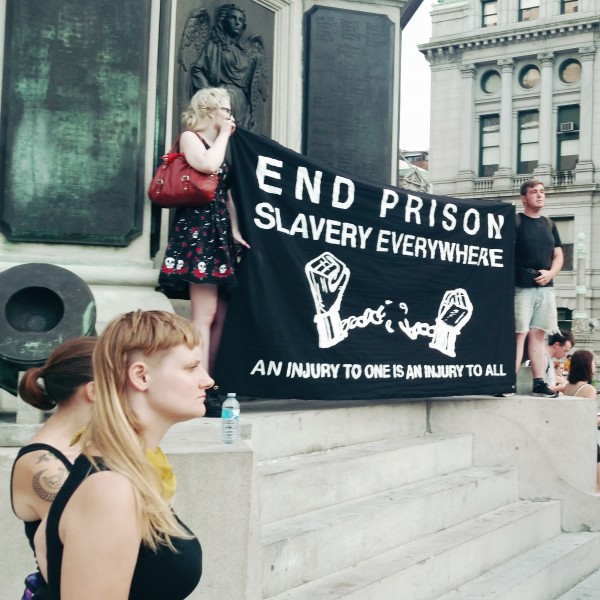
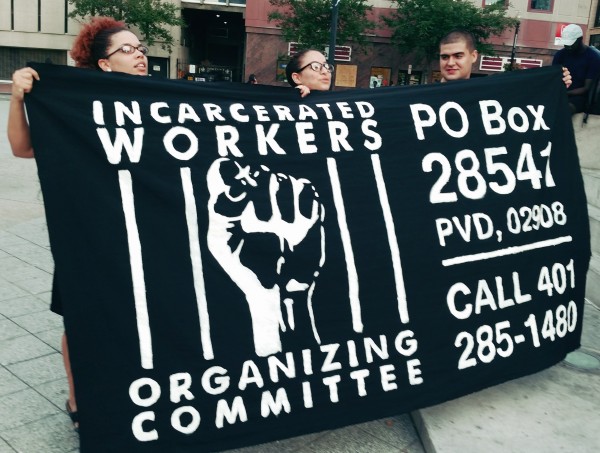
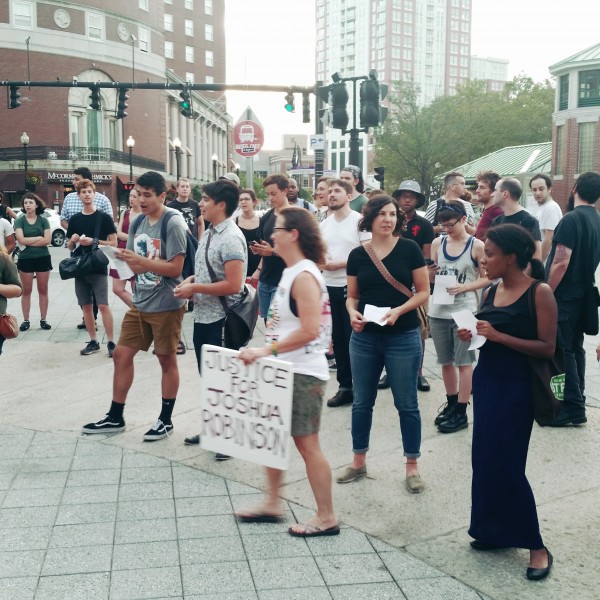
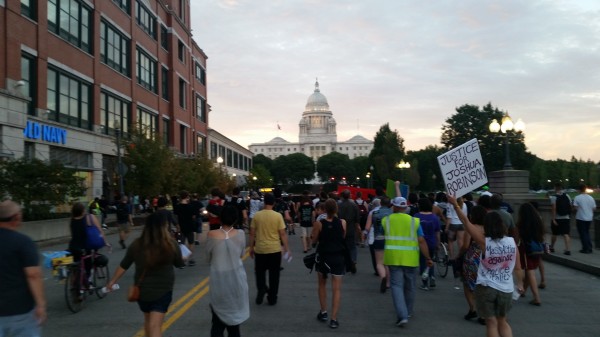
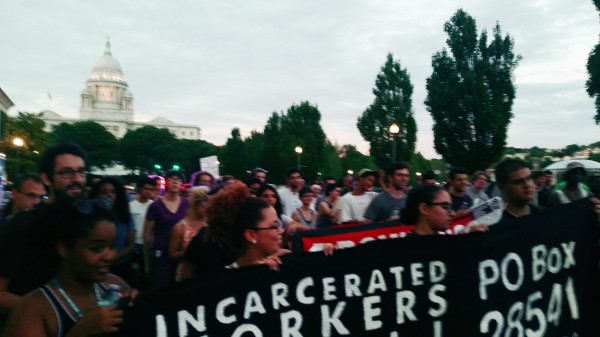
 In a precedent-setting ruling, U.S. District Judge Ronald Lagueux issued a decision today holding that the City of Cranston violated the one person, one vote requirements of the U.S. Constitution when it allocated the entire incarcerated population of the Adult Correctional Institutions (ACI) as “residents” of one ward of the City when it drew district lines for the City Council and School Committee following the 2010 Census. The ruling allows the City 30 days to present the Court with a new redistricting plan meeting constitutional requirements.
In a precedent-setting ruling, U.S. District Judge Ronald Lagueux issued a decision today holding that the City of Cranston violated the one person, one vote requirements of the U.S. Constitution when it allocated the entire incarcerated population of the Adult Correctional Institutions (ACI) as “residents” of one ward of the City when it drew district lines for the City Council and School Committee following the 2010 Census. The ruling allows the City 30 days to present the Court with a new redistricting plan meeting constitutional requirements.
Today’s ruling, just the second of its kind in the nation, concluded that the City artificially inflated the population count of Ward 6, where the ACI is located, by treating all incarcerated persons as “residents” of the prison for redistricting purposes. Doing so, said the court, violates the rights of persons residing in other wards to equal representation as required by the Equal Protection Clause of the Constitution.
“I’m thrilled that our fight for equal representation has been successful,” said Karen Davidson, lead plaintiff. “Fairness in redistricting is a fundamental right and I’m glad that the court has vindicated our claims.”
At issue in the case was the City of Cranston’s choice to count the more than three thousand inmates at the ACI in a single city ward for the purposes of drawing City Council and School Committee districts. Plaintiffs argued this “prison gerrymandering” was improper because those incarcerated at the ACI are not true constituents of local elected officials, but instead remain residents of their pre-incarceration communities for virtually all legal purposes, including voting.
Judge Lagueux agreed with the plaintiffs’ claims, stating that “the ACI’s inmates lack a ‘representational nexus’ with the Cranston City Council and School Committee.” He noted that “Cranston’s elected officials do not campaign or endeavor to represent their ACI constituents,” and pointed out that that the majority of incarcerated persons cannot vote, and those who can are required by law to vote by absentee ballot from their pre-incarceration address.
Due to the questionable counting, persons at the only state-run correctional facility in Rhode Island account for 25% of Ward 6’s total “population.” According to Census Bureau data, without the incarcerated population, Ward 6 has only 10,209 true constituents. Yet those constituents now wield the same political power as the roughly 13,500 constituents in each of the other wards.
Cranston residents Karen Davidson, Debbie Flitman, Eugene Perry, and Sylvia Weber joined the ACLU of Rhode Island as plaintiffs in the case. They were represented in federal court by Demos, the Prison Policy Initiative, the American Civil Liberties Union, and the ACLU of Rhode Island.
“This is a big win for democracy,” said Adam Lioz of Demos, counsel for the plaintiffs. “Prison gerrymandering distorts representation and should no longer be tolerated. This decision should pave the way for other courts to address this long-standing problem.”
“We applaud the court’s decision requiring the City to correct its prison gerrymandering problem without delay,” said Steven Brown, executive director of the ACLU of Rhode Island. “It is time for Cranston to stop holding elections under a one-person, three-quarters of a vote regime.”
“Counting people at the ACI as constituents of Ward 6 officials made no sense,” said Aleks Kajstura of the Prison Policy Initiative. “They can’t use the park or library, attend a City Council meeting, or send their kids to public schools. And, even those who can vote must do so from their actual legal residence, not the prison location.”
“This ruling means that Cranston can no longer play games with our democracy by artificially inflating the political power of one district over another. People who are incarcerated should be counted as residents of the districts where they lived, not as so-called ‘residents’ of where they are involuntarily confined,” said Sean Young, staff attorney with the ACLU’s Voting Rights Project.
ACLU of RI volunteer attorney Lynette Labinger added: “The ACLU first urged the City to redraw its district lines four years ago in order to protect the rights of voters in the City’s five other wards. I am gratified that they should soon have their voices heard in equal measure with those in Ward 6.”
The case is Davidson et. al. v. City of Cranston. Plaintiffs’ complaint can be found here and their response to Defendant’s motion to dismiss is here. Judge Lagueux’s ruling is here.
[From a press release]
]]>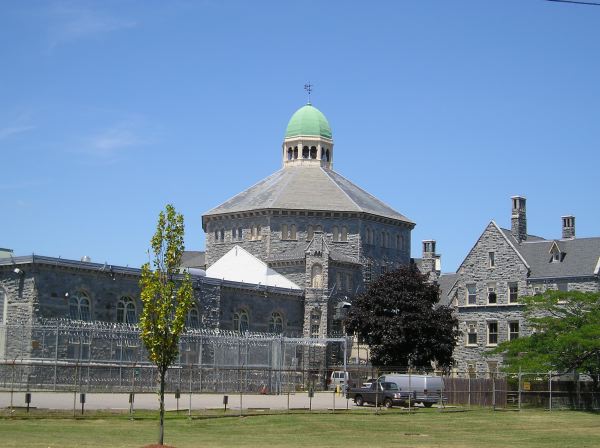 Gender discrimination and the invisibility of women has been an issue in this world since before I was born. In my lifetime, I have seen attempts of changing this, steps toward gender equality. In my current situation, the invisibility of women is still an issue.
Gender discrimination and the invisibility of women has been an issue in this world since before I was born. In my lifetime, I have seen attempts of changing this, steps toward gender equality. In my current situation, the invisibility of women is still an issue.
I am currently doing a six-year sentence in the women’s maximum/medium security facility. The facility is housing women with thirty-day sentences to life sentences. This building was not built to house inmates with long-term sentences. It was going to be a transition facility, which means there was not going to be anyone staying here for more than one year.
For whatever reason, something different happened. They took the women from a condemned prison (thank you) to this facility. Although the other prison was infested with roaches and mice, there was one thing to look forward to: “rec” (recreation) time. That building had a gym with weights and other workout equipment and a very large yard, that included an area with a basketball court and a large grassy space. We gave up a dirty old building for a newer one with no gym, and a yard that consists only of a basketball court. And that yard is all cement.
The yards at the men’s facilities (also medium and maximum) are much bigger than ours, with grass areas, weight areas, and a basketball court, as well as track and soccer fields. I do not know the exact measurements of the yard, but I don’t think the size of our yard is even a fraction of the size of theirs. They have the space to play a number of sports/activities. We can walk, play basketball with a ball that is basically flat, or volleyball until the ball goes over the fence and can’t be retrieved. What makes it okay for the men to have that yard but not the women? One may answer this question saying that there are more men than women incarcerated in Rhode Island, but I still don’t see that as a reason to deprive us women from having a better yard.
This may not matter to people who are not incarcerated, but it surely does matter to those of us who are. Rec time is very important; it’s a time to blow off steam, and it’s a way to stay healthy by exercising. It is also important for mental health. I know this issue may not ever matter or mean anything to people who do not have to be locked up in a facility on a daily basis and have only two hours a day to breathe fresh air.
I see signs that the overall problem of gender discrimination and the invisibility of women in the changing in the world. I think it only right that it change within this institution as well.
- This post is published as part of the Prison Op/Ed Project, an occasional series authored by CCRI sociology students who are incarcerated at the Rhode Island Adult Correctional Institute. Read more here:
- ‘Prison Op/Ed Project’ teaches civic engagement, writing – Meghan Kallman
- Does racial injustice still exist? Look at our schools – Aaron Carpenter
- Rhode Island charges felons absurdly high court costs – Christopher Nemitz
- Public school students and inmates need more vocational training – Darnell Hie
- Prison policies put probation and vocational training at odds – Norman Johnson
- Corporate-modeled prison industrial complex doesn’t serve society – Adrian Rojas
- Incarceration is the new slavery – James Poston
- Justice isn’t blind with data-based sentencing – David Brown
- Ending welfare entitlements opened the door to disability fraud – Dan Davidson
- Post prison services would stem system’s revolving door – Michael Wheelock
- You’re vote doesn’t matter as much as your money – David Brown
- How schools emulate prisons, and prepare students for them – Richard Pimiental
- Cars that are good for society – David DeGrasse
- PTA involvement instead of prison mentality in schools – Mustapha Bojang
- Prison is about re-socialization, not corrections – Christopher Marsich
- ACI administrator praises Prison Op/Ed Project – Ralph Orleck
- Alcohol, incarceration and what it means to matter – Laura Baumgardner
- Was Myron Magnet a genius or just a Republican? – Danny Mercure
- Ike was right: Military industrial complex corrupted economy – Christopher Marsich
- Second Chance Act deserves second chance at full funding –
- Who poses a bigger threat to US: Ben Carson or Ahmed Mohamed? – David Brown
- Taking a play out of black Mizzou football players playbook – James Poston
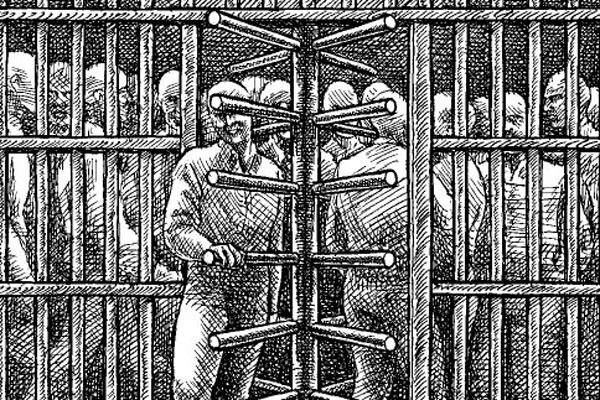 It is difficult, if not impossible, to pursue the goals of punishment at the same time as rehabilitation and reentry.
It is difficult, if not impossible, to pursue the goals of punishment at the same time as rehabilitation and reentry.
Probation is a punishment, and Rhode Island is a national leader in this form of punishment. As noted recently in the Providence Journal, the Governor’s workgroup is looking at ways to amend the state’s practices. Hopefully, any suggestions that pass the legislature or Department of Corrections are substantial and impactful. The crux of this, however, will depend on whether the state has an appetite to reduce punishments and thereby increase rehabilitation and reentry. Keep in mind that some people get sentenced directly to probation while others serve that sentence following a stint in prison.
As a former member and organizer with Direct Action for Rights and Equality (DARE) who has been serving a punishment for 22 years, I can tell you that many Rhode Islanders have been thinking long and hard about this topic, long before anyone could imagine a reduction in punishments for any offense. People are hampered in their attempts to live a productive life because of the crimes we have committed in the past, as there is a natural tendency to exclude us; however, this is reinforced by a probation status that serves to deny jobs, deny homes, deny education, and deny opportunities to help others.
DARE is the only membership-based grassroots organization in Rhode Island with a focus on criminal justice policies. Since forming our Behind the Walls committee in 1998, we are the only policy organization with formerly incarcerated people in leadership, and played a critical role in re-enfranchising people on probation and parole, reducing prison phone rates, ending mandatory minimum sentences, unshackling pregnant women, reducing employment discrimination with Ban the Box, ending probation violations based on dismissed new charges, and (soon) ending blanket discrimination in public housing.
As community members who are overwhelmingly impacted by criminal justice policies, we want to generate stability, support individuals and strengthen our community. Our membership is reflective of the low income communities of color that have the fewest resources to deal with unemployment, homelessness, mental illness, physical health, and substance abuse; i.e. the primary drivers of mass incarceration. Our community members are often both victims and perpetrators of crime, generally excluded from victims’ services once we are convicted. We live this issue, multi-generationally, in a state that has issued over 150,000 prison ID numbers in recent decades.
Ten years ago, DARE took an analytical approach to probation reform in Rhode Island. We knew the stories and lived the lives of people on probation. We recognized patterns of structural discrimination, financial hardship, and mental anguish that make it hard for any normal person to succeed. We recognize that probation is punishment, and the lengthy punishment of our family members, people living in our homes and raising our children, has been a disaster.
DARE articulated a four-point interlocking probation reform platform:
- Limit sentencing on violations to the time remaining on probation (Rule 32(f)). Thus, if one has a single day remaining on a 10-year probation term, they can only be sentenced to a single day. Whereas the status quo is that a judge may instead impose an entire 10-year suspended sentence, we believe this is not only morally flawed but also exceeds (in some cases) the statutory limits on certain crimes.
- Eliminate the 120-day limitation on filing a motion for a sentence reduction (Rule 35). Circumstances rarely change to justify a reduction within four months of the original sentence, yet when someone is serving a ten or fifty year sentence- they will often change over the years. Although the DOC can put some people on low supervision or banked status, their sentence has not ended for any of the structural discrimination purposes such as housing, employment, or volunteering. Nor are they free of the punishment’s mental and spiritual impacts.
- Extend Good Time to people on probation and parole (R.I.G.L. §42-56-24). This adjustment would have several effects, by (a) incentivizing good behavior, (b) naturally shortening sentences, and (c) allow probation officers and/or judges to take away earned Good Time for lower level infractions, similar to ACI discipline boards.
- Allow for violations to be dismissed where the new underlying charge is also dismissed (Rule 32(f)). This proposal passed the legislature after several years of advocacy. It was particularly frustrating when few people believed it was happening, and momentum shifted after Rep. Patrick O’Neill (a criminal defense attorney) interjected during a committee hearing that it is true: sometimes a new allegation comes along and within a few weeks the prosecutor offers a “deal” to plead guilty. If they don’t take the deal, then a maximum sentence on the probation violation is guaranteed. Defendants believe that guarantee, knowing the extremely low standard of guilt, eroded rules of evidence, and notorious cases such as Richard Beverly and Meko Lincoln. Both involved the dubious testimony of police officers ultimately revealed as criminals themselves. Most are “smarter” than Richard and Meko, accepting a few years in prison rather than risk lengthy violations.
These four reforms would reduce the number of people on probation, reduce the number of violations, incentivize good behavior, and allow people a better chance at a second chance.
There is no such thing as a second chance, a fresh start, or anything of the like while on probation. There has long been massive investment in low-income communities, however it has come in the form of police and prisons. Millions of dollars are spent in each neighborhood, although none of that money is an actual local investment. We are not widgets for processing, nor animals for study, nor wetlands to be saved. We are parents, children, brothers, sisters, workers, voters, and even policy experts.
We want a criminal justice system that can protect us without hurting us, where cages are a last resort, where punishments can end, and people can overcome their mistakes. We are the number one stakeholder in reducing overall crime and punishment, and reinvesting resources into affordable housing, jobs, education, along with a health care approach to addiction and mental illness.
I’ve long acknowledged that my sentence will never end, and do not take issue with that. I left Rhode Island to get an education, as my applications were rejected by Brown, URI, RISD, Salve Regina, Providence College, and Roger Williams Law School. Furthermore, several arts organizations, mentorships, and the Training School would not let me volunteer. Regardless of my own saga, Rhode Island needs to look at the systemic issues, and not isolate a few cases. To that end, the Governor would be well served to pick the brains of people who have lived these issues, from cradle to grave.
]]> The American Civil Liberties Union of Rhode Island today announced the settlement of a federal lawsuit on behalf of Jason Cook, an ACI inmate who, the suit alleged, was the victim of retaliation by prison officials for publicly criticizing RI Department of Corrections’ (DOC) mail policies and seeking legal assistance from the ACLU. Under the settlement, the DOC, while denying any liability, has agreed to pay a total of $7,500 in damages and attorneys’ fees.
The American Civil Liberties Union of Rhode Island today announced the settlement of a federal lawsuit on behalf of Jason Cook, an ACI inmate who, the suit alleged, was the victim of retaliation by prison officials for publicly criticizing RI Department of Corrections’ (DOC) mail policies and seeking legal assistance from the ACLU. Under the settlement, the DOC, while denying any liability, has agreed to pay a total of $7,500 in damages and attorneys’ fees.
The ACLU of RI filed the suit in 2009 after Cook experienced a pattern of harassment by prison officials after being quoted in the Providence Journal criticizing a new DOC policy limiting the written materials available to inmates. He was fired from his job in the kitchen, and after the ACLU of RI questioned the mail policy, the suit alleged that correctional officers conducted a search of Cook’s cell that damaged some of his personal property, and then subjected him to various investigations, bookings, discipline, and unwarranted strip searches.
The ACLU argued that this pattern of harassment by corrections officials against Cook violated his First Amendment right to freedom of speech “and displayed both deliberate indifference and a reckless disregard of Cook’s constitutional rights.” Prison officials’ alleged misconduct continued even after Cook filed suit. The day after the complaint was served on a number of the defendants, the suit claimed that all of the previously active phone numbers on Cook’s call list, except for his attorneys, were suddenly deactivated.
The suit further claimed that the various disciplinary actions taken against him violated Cook’s due process rights. In 2013, U.S. District Judge William Smith rejected the DOC’s efforts to have the lawsuit dismissed.
ACLU volunteer attorney Shad Miller, from the law firm DeLuca & Weizenbaum, Ltd., said today: “I give Jason a lot of credit for pursuing his claims against individuals and an institution which had tremendous power and control over every activity of his daily life. It took courage to challenge these authorities and to hold them responsible for their allegedly unwarranted and retaliatory acts against him. It also took persistence to see the legal process through to reach a satisfactory resolution because at every step of the way the defendants vigorously denied and disputed the allegations against them.”
Plaintiff Cook stated: “The federal court has righted the wrongs committed against me. I hope that this settlement will send a clear message to the employees of the state prison that just because a person is incarcerated, we are still human beings and have rights.”
The mail policy at issue that Cook initially protested, and that was ultimately withdrawn after the ACLU intervened, barred family members from ordering books or magazine subscriptions for inmates. Instead, inmates could only obtain publications directly from a publisher with their own funds.
More information about the case is available here: http://riaclu.org/court-cases/case-details/cook-v.-wall
[From an ACLU press release]
]]> As human beings, we all have a strong desire to feel important to the world around us. The intense need to feel like we matter has a strong hold on our lives. If that is positive or negative … well, that is up to you.
As human beings, we all have a strong desire to feel important to the world around us. The intense need to feel like we matter has a strong hold on our lives. If that is positive or negative … well, that is up to you.
The feeling of loneliness, in a world that gives us the freedom to distinguish who we are, is the most damaging pain to endure. This can cause a person to go to any lengths to try and be noticed, even if those are harmful or self-destructive lengths. After all, it is better to get negative recognition than to feel worthless. This need to get attention can cause one to act out to the point of no return—take the recent massacre in Oregon, for example. That person needed to matter, he needed to be known, at any cost, and his only way to get attention was through an act of violence. This is how he chose to “matter”.
Our society is very individualistic, but yet the need to matter is in us all. The consequences of not feeling like we matter can be very grave. I used to feel this way as well. However, once I stepped out of my own world and looked at my life, I realized how much I do matter to my family, peers, neighbors, employer, and lover – both positively and negatively. I have let many down by being incarcerated and making poor choices.
I was unable to fulfill my position at work because I came to jail, which affected both the students and teachers where I work. I was unable to finish my summer college courses. I was unable to live on life’s terms. I picked up a drink and I drove drunk, harming other people and putting others’ lives in danger. I could have died or killed someone that day. I see how putting alcohol first affected my behaviors and morals, self-esteem, goals, and achievements. Alcohol was my key to numb my pain. It was my escape, and it was all that mattered.
I have lost trust with people that matter most to me. I have affected my wide social web. I have realized how fortunate I am to have a second chance and see that my choices in life do matter—not just to me, but also to those around me.
Looking back at the people I’ve helped stay sober – who are still fighting alcoholism daily – I realize that I have mattered in their lives too, because I helped keep them in programs even when their will was failing. When I see these people they acknowledge my efforts and tell me how much I have made a differences in their lives. They tell me they don’t know where they would be if I hadn’t been there to support them in their recovery. This shows me that mattering as a person just isn’t for oneself—it is for society. Our role in society as human beings matters. We all matter, even when we don’t feel like we do.
Being important to each other cannot be defined in a paragraph. To matter to each other is to live. It is to be human, to follow your path, to make your decisions, and understand how you affect the world around you. Being important is so much more than a word or a description. It defines all human beings and all we stand for. It is the distinction of our existence and how we choose to live on earth. You can choose to be important to yourself; you can decide how your life will be, and how you want to be affected by the way you matter to the world.
- This post is published as part of the Prison Op/Ed Project, an occasional series authored by CCRI sociology students who are incarcerated at the Rhode Island Adult Correctional Institute. Read more here:
- ‘Prison Op/Ed Project’ teaches civic engagement, writing – Meghan Kallman
- Does racial injustice still exist? Look at our schools – Aaron Carpenter
- Rhode Island charges felons absurdly high court costs – Christopher Nemitz
- Public school students and inmates need more vocational training – Darnell Hie
- Prison policies put probation and vocational training at odds – Norman Johnson
- Corporate-modeled prison industrial complex doesn’t serve society – Adrian Rojas
- Incarceration is the new slavery – James Poston
- Justice isn’t blind with data-based sentencing – David Brown
- Ending welfare entitlements opened the door to disability fraud – Dan Davidson
- Post prison services would stem system’s revolving door – Michael Wheelock
- You’re vote doesn’t matter as much as your money – David Brown
- How schools emulate prisons, and prepare students for them – Richard Pimiental
- Cars that are good for society – David DeGrasse
- PTA involvement instead of prison mentality in schools – Mustapha Bojang
- Prison is about re-socialization, not corrections – Christopher Marsich
- ACI administrator praises Prison Op/Ed Project – Ralph Orleck
 Racial injustice. Voting. Prisons. Entitlements. Zero tolerance. These are but a few of the topics written about by inmates enrolled in the Community College of Rhode Island Introductory Sociology class taught by Meghan Kallman in the John J. Moran Medium Security facility. Ms. Kallman was gracious in submitting all papers for my review and as I reviewed the body of work I felt proud.
Racial injustice. Voting. Prisons. Entitlements. Zero tolerance. These are but a few of the topics written about by inmates enrolled in the Community College of Rhode Island Introductory Sociology class taught by Meghan Kallman in the John J. Moran Medium Security facility. Ms. Kallman was gracious in submitting all papers for my review and as I reviewed the body of work I felt proud.
Proud of the ability of students to express themselves appropriately. Proud to be able to offer CCRI courses to the offender population. Proud of the quality and scope of educational services within the RIDOC. Proud of the commitment of not only Ms. Kallman, but of the entire faculty and staff associated with RIDOC education programs. Proud to be part of a team committed to providing quality educational services to the offender population.
Introductory Sociology was but one of several CCRI programs offered to offenders. HVAC, Culinary Arts, Plastering and Dry Wall, and Computer Literacy are a sampling of CCRI vocational offerings. The RIDOC Education Unit also has Adult Basic Education and GED classes offered in all facilities. During Fiscal 2015, there were 196 GED’s earned and 13 AA degrees were awarded by CCRI.
Do the participants appreciate what we do for them? In my heart of hearts, I believe the answer is a definite yes. I don’t have data to answer this question, so why do I say yes?
Recently, GED teacher Angie Barboza passed away unexpectedly. The outpouring of sympathy and support expressed by the inmates as I walked through the yard was moving and sincere. The appreciation of all that she did for them as a teacher was touching. While my own heart breaks over this loss, the outpouring of supportive comments reinforced the pride I feel in all that they do – faculty, staff, and students.
Before the severity of Angie’s illness was known and her return was expected, one of her students wrote, “You taught me all kinds of math. Even though I was going to give up, you would talk me out of it…You give me hope for trying to achieve my GED.”
I believe that education is the key to hope for a better life. This belief is supported by data. (Read a recent study by the staff of the Correctional Education Association, the US Department of Education, and the Indiana Department of Correction on the benefits of correctional education programs.) I am grateful for the commitment of the RIDOC in its support of educational and vocational programming for the offender population consistent with its mission. The Education Unit strives to offer high quality programs on a daily basis.
- This post is published as part of the Prison Op/Ed Project, an occasional series authored by CCRI sociology students who are incarcerated at the Rhode Island Adult Correctional Institute. Read more here:
- ‘Prison Op/Ed Project’ teaches civic engagement, writing – Meghan Kallman
- Does racial injustice still exist? Look at our schools – Aaron Carpenter
- Rhode Island charges felons absurdly high court costs – Christopher Nemitz
- Public school students and inmates need more vocational training – Darnell Hie
- Prison policies put probation and vocational training at odds – Norman Johnson
- Corporate-modeled prison industrial complex doesn’t serve society – Adrian Rojas
- Incarceration is the new slavery – James Poston
- Justice isn’t blind with data-based sentencing – David Brown
- Ending welfare entitlements opened the door to disability fraud – Dan Davidson
- Post prison services would stem system’s revolving door – Michael Wheelock
- You’re vote doesn’t matter as much as your money – David Brown
- How schools emulate prisons, and prepare students for them – Richard Pimiental
- Cars that are good for society – David DeGrasse
- PTA involvement instead of prison mentality in schools – Mustapha Bojang
- Prison is about re-socialization, not corrections – Christopher Marsich
 Imagine a herd of sheep on the range, with each animal going off in a different direction and doing their own thing. It would be a rancher’s worst nightmare, and would surely make the business of ranching far more difficult. Prisoners are not sheep, but the prison guards that watch over us wouldn’t mind if we were.
Imagine a herd of sheep on the range, with each animal going off in a different direction and doing their own thing. It would be a rancher’s worst nightmare, and would surely make the business of ranching far more difficult. Prisoners are not sheep, but the prison guards that watch over us wouldn’t mind if we were.
The guards find it easier when inmates are re-socialized into something easy to control. Such institutionalized prisoners are ideal for the efficient locking up of human beings. This type of person will more mindlessly goes about their day. Prisons use the process of re-socialization as a means of control and conformity. It strips away a person’s former identity and allows institutional agents to remold us how they see fit. But the end product is institutionalized inmates bound for recidivism.
The prison system may be less unruly and easier to operate as a business, and the lucrative business of incarceration may even prosper with its growing prison population. But is that the real intention of prison? Is it for the inmate, or for society? If society is truly concerned with fixing the corrections system, then more effort must be made towards the business of “corrections” as opposed to the business of institutional re-socialization..
Institutionalization may be good for prison business, but it is bad for society. Most prisoners are eventually released back into society, and usually much worse for the wear. Most of these former inmates find themselves “uncorrected” – unable to find work, still unskilled, and worst of all, unreformed. Unfortunately, these people end up back in jail, and re-socialization is never that difficult the second time around for the recidivist.
- This post is published as part of the Prison Op/Ed Project, an occasional series authored by CCRI sociology students who are incarcerated at the Rhode Island Adult Correctional Institute. Read more here:
- ‘Prison Op/Ed Project’ teaches civic engagement, writing – Meghan Kallman
- Does racial injustice still exist? Look at our schools – Aaron Carpenter
- Rhode Island charges felons absurdly high court costs – Christopher Nemitz
- Public school students and inmates need more vocational training – Darnell Hie
- Prison policies put probation and vocational training at odds – Norman Johnson
- Corporate-modeled prison industrial complex doesn’t serve society – Adrian Rojas
- Incarceration is the new slavery – James Poston
- Justice isn’t blind with data-based sentencing – David Brown
- Ending welfare entitlements opened the door to disability fraud – Dan Davidson
- Post prison services would stem system’s revolving door – Michael Wheelock
- You’re vote doesn’t matter as much as your money – David Brown
- How schools emulate prisons, and prepare students for them – Richard Pimiental
- Cars that are good for society – David DeGrasse
- PTA involvement instead of prison mentality in schools – Mustapha Bojang
